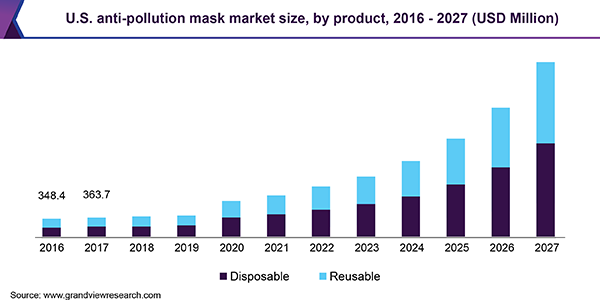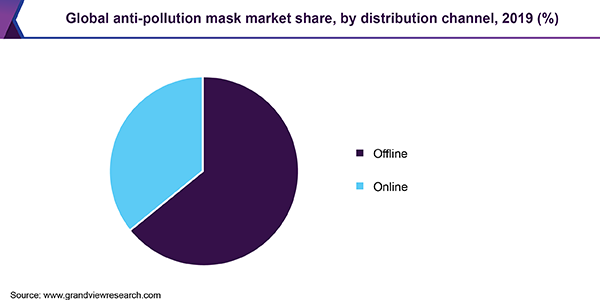
Anti-pollution Mask Market Size, Share & Trends Analysis Report By Product (Disposable, Reusable), By Distribution Channel (Online, Offline), By Region, And Segment Forecasts, 2020 - 2027
- Published Date: Apr, 2020
- Base Year for Estimate: 2019
- Report ID: GVR-3-68038-330-0
- Format: Electronic (PDF)
- Historical Data: 2016 - 2018
- Number of Pages: 80
Report Overview
The global anti-pollution mask market size was valued at USD 2.7 billion in 2019. Rising demand for pollution filtering products such as anti-pollution masks for maintaining health and well-being will boost market growth. The product’s demand is fueled by the rising prevalence of health ailments such as asthma and lung cancer due to rising pollution levels. Furthermore, the recent Coronavirus epidemic since the beginning of 2020 has spurred the demand for both disposable and reusable anti-pollution masks worldwide.

Increasing demand for anti-pollution masks along with a shortage in the supply has led to many manufacturers ramping up their production capacity, which is among the key attributes driving the market growth. Consumers have been gravitating toward the usage of anti-pollution masks to protect themselves from breathing in pathogens that may be present in the air.
Anti-pollution masks, which filter out particles, are designed for commuters to protect them from pollutants in the air. A well-fitted mask of proper size, which covers the nose, mouth, and chin without leaving any space, is necessary for effective protection. The mask with irregular shape and structure prove to be non-effective as the particulate matter could get stuck in the filters.
Increasing urbanization and industrialization rates in developing economies such as China and India pose an alarming threat to pollution levels. Moreover, in the wake of safety and well-being of consumers, the industrial sector imposes stringent government regulation for employees in offices, factories, and construction areas. Thus, increasing demand for safety and health issues due to airborne diseases has fueled the demand for anti-pollution masks at global level. Increasing trend of online purchasing is expected to boost the demand for anti-pollution masks on online portals such as Amazon and Alibaba.
Manufacturers are taking constant efforts to introduce newer products of anti-pollution masks in the market in order to provide variety of options to the customers. For instance, in December 2017, Clean Air Store, an e-commerce portal that provides protection solutions from indoor and outdoor pollution, launched RespoKare mask. The product features pollution indicator that conveys the level of NO2 gas exposure by the wearer.
Product Insights
一次性anti-pollution mask was the largest product segment, accounting for more than 53.0% of the market share in 2019. The rising pollution levels across the globe have forced the government bodies to act on stringent regulations regarding pollution control and their remedies. Disposable anti-pollution masks are manufactured from a low-cost viable material, which consist of multiple layers ofnon-woven fabric. These layers provide liquid resistance and help prevent perspiration, facial hair, or saliva from clogging the mask. Furthermore, the other layers are produced from non-woven, melt blown, and liquid-resistant polypropylene material. It helps in creating barrier against bacteria, body fluids, and particulate contaminants. The durability of the product is relatively lesser, ranging from months to years, depending on the level of filters.
The reusable anti-pollution mask segment is expected to exhibit a CAGR of 30.2% from 2020 to 2027. These masks have long durability and are produced for long term usage with higher prices compared to disposable anti-pollution masks. The reusable anti-pollution mask respirators consist of a sheet ofactivated carbonas well as replaceable filters that are required to be replaced within a time of 3-4 days of usage. Manufacturers strive for product innovation in the category focusing on customer convenience. For instance, in May 2017, HEALTH INNOVATIVE launched world’s first invisible anti-pollution pit nose mask produced from high-quality polyester non-woven cloth filter. The product consists of pollen and pollution filtration rate of 99.5% and provides safety from airborne viruses, pollution, Particulate Matter 2.5 (PM2.5), particles, Bronchitis, Asthma, respiratory problems, and running nose.
Distribution Channel Insights
Offline channel was the largest distribution channel segment, accounting for more than 64.0% of market share in 2019. The shifting inclination of consumers toward offline purchase, which caters to instant product detailing as well as practical usage is expected to keep high utility of offline channels as key selling sources among buyers. The increasing acceptance of anti-pollution masks has increased the availability of product in the market. The products are often made available in supermarkets and hypermarket and are mostly sold through specialty stores.

Online channel of distribution is projected to foresee a CAGR of 30.3% from 2020 to 2027 owing to increasing adoption of online media as a medium to purchase products. Online purchasing is witnessing growth at fastest pace owing to a variety of product options at greater convenience and discounted prices. Rising preference for original and branded products have influenced the consumers to purchase from company websites, thus making online platforms, a lucrative channel.
Regional Insights
亚太地区最大的anti-pollutio举行n mask market share, accounting for 33.0% of the global revenue in 2019. Increasing pollution levels in the region have deteriorated the air quality in countries such as China and India. According to WHO, in 2015, China and India had 1.1 million deaths on account of air pollution, which was approximately 50% of the global air pollution deaths in 2015. The governments of China and India have undertaken number of measures to curb the problem such as graded air quality rating response system and emission-reducing converters for automobiles. Rising adoption of anti-pollution masks in the region is expected to fuel the market in the forecast period.
North America is expected to witness considerable growth on account of an increasing consciousness among population toward health and well-being along with rising awareness for anti-pollution masks pertaining to increasing pollution levels. The government has imposed stringent regulations in order to improve air quality standards. The Clean Air Act established by the Environmental Protection Agency in the U.S in 1970 has been associated with establishing national air quality standards. The act aims to reduce level of sulfur dioxide and other pollutants, thereby leading to reduction in mortality rate.
Anti-pollution MaskMarket Share Insights
Key manufacturers in the market include 3M; Honeywell International Inc.; KCWW; Totobobo Pte. Ltd.; MSA; RESPRO; Ohlone Press LLC; idMASK Co., Ltd.; NIRVANA BEING; and Reckitt Benckiser Group plc. Some of the industry participants are introducing innovations in their products as a key strategy to increase their market share. In January 2018, Reckitt Benckiser’s brand Dettol launched its air protect mask on e-commerce sites. The product features two replaceable filters and provides protection against PM 2.5, bacteria, dust, and pollen.
Report Scope
Attribute |
Details |
Base year for estimation |
2019 |
Actual estimates/Historical data |
2016 - 2018 |
Forecast period |
2020 - 2027 |
Market representation |
Revenue in USD Million & CAGR from 2020 to 2027 |
Regional scope |
North America, Europe, Asia Pacific, Central & South America, and MEA |
Country scope |
U.S., Mexico, Germany, China, India, Brazil, South Africa |
Report coverage |
Revenue forecast, company share, competitive landscape, growth factors and trends |
15% free customization scope (equivalent to 5 analyst working days) |
If you need specific information, which is not currently within the scope of the report, we will provide it to you as a part of customization |
Segments Covered in the Report
This report forecasts revenue growth at global, regional, and country levels and provides an analysis on the latest industry trends and opportunities in each of the sub-segments from 2016 to 2027. For the purpose of this study, Grand View Research has segmented the global anti-pollution mask market on the basis of product, distribution channel, and region.
Product Outlook (Revenue, USD Million, 2016 - 2027)
一次性Mask
Reusable Mask
Distribution Channel Outlook (Revenue, USD Million, 2016 - 2027)
Offline
Online
Regional Outlook (Revenue, USD Million, 2016 - 2027)
North America
The U.S.
Mexico
Europe
Germany
Asia Pacific
China
India
Central & South America
Brazil
Middle East & Africa (MEA)
South Africa
Frequently Asked Questions About This Report
b.The global anti-pollution mask market size was estimated at USD 2.71 billion in 2019 and is expected to reach USD 2.91 billion in 2020.
b.The global anti-pollution mask market is expected to grow at a compound annual growth rate of 9.3% from 2020 to 2027 to reach USD 4.77 billion by 2027.
b.Asia Pacific dominated the anti-pollution mask market with a share of 33.01% in 2019. This is attributable to the increasing pollution levels in countries such as India in recent years.
b.Some key players operating in the anti-pollution mask market include 3M; Honeywell International Inc.; KCWW; Totobobo Pte. Ltd.; MSA; RESPRO; Ohlone Press LLC; idMASK Co., Ltd.; NIRVANA BEING; and Reckitt Benckiser Group plc.
b.Key factors that are driving the market growth include the rising usage of pollution filtering products worldwide and the unprecedented escalation in the demand for the product owing to the novel COVID-19 pandemic.
Pricing & Purchase Options
服务保证
-
Insured Buying
This report has a service guarantee. We stand by our report quality.
-
Confidentiality
We are in compliance with GDPR & CCPA norms. All interactions are confidential.
-
Custom research service
Design an exclusive study to serve your research needs.
-
24/5 Research support
Get your queries resolved from an industry expert.




